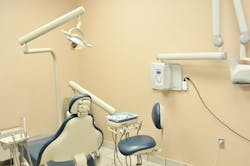Elementary Care: Oral health supporters collaborate to develop school clinic
Oral health supporters collaborate to develop school clinic
BY CHRISTINE NATHE, RDH, MS
The provision of school-based dental care has a history that coincides with the creation of dental hygiene. When initiating the dental hygiene movement, Dr. Alfred Fones first began a project with the Bridgeport Public Schools that coincided with the first college curriculum of dental hygiene. In fact, Dr. Fones wrote that he inaugurated a campaign to secure dental hygiene services for Bridgeport schoolchildren. He did write that it took four years of strenuous effort to convince the city officials, but finally, in 1913, $5,000 was appropriated to the Board of Education to conduct the first demonstration of the value of an educational and preventive dental care program.1 Thus, when an announcement was issued recruiting for the first class of dental hygienists, he promoted the demand for these providers in public institutions such as schools, hospitals, and sanitariums.
-------------------------------------------------
Other articles by Nathe
-------------------------------------------------
Fones further suggested that the dental profession was unable to cope with the universal need for mouth hygiene and that dental hygiene was created from the realization that mouth hygiene was a necessity.1 He further promoted the solution for the public health problem of mouth hygiene to be professionals who accessed the population in the public arenas as outreach workers, providing preventive care and referring patients in need to dental offices.1 This was and still is a logical method to promote dental public health and ensure access to care, while utilizing both providers effectively.
Fast forward to 2014, when school-based dental clinics are finally becoming a more common fixture in some school systems. More dental hygienists are working in school-based programs and more dental hygienists are instrumental in starting these types of programs.
School-based spotlight
The comprehensive school-based dental program at Rodney B. Cox Elementary School was developed to increase access to dental care for underserved pediatric patients with Medicaid insurance and uninsured children in Dade City, Florida. Unique in its scope of services that begin with exams, cleanings, sealants, fillings, and extractions, this program was designed to serve a priority population in the rural county seat. The overarching goal of this program is to provide dental care to underserved children.
The Department of Health (DOH)-Pasco partnered with the District School Board of Pasco County and the Rodney B. Cox (Cox) Elementary School to revive a dental facility built at Cox Elementary School in 1994 through a grant. Since 1994, this school dental facility had been used sporadically and in a limited capacity through arrangements with volunteer dentists. There were no strategic plans for the program or long-term sustainability goals. The dental facility was underutilized and did not fulfill the funding grant's intent.
So, in 2011, the DOH-Pasco initiated the program by providing dental providers for three days per week to serve the dental care needs of students at Cox Elementary and the surrounding schools. DOH-Pasco assumed financial responsibility to maintain the dental facility and provide supplies needed to operate the dental clinic. The dental clinic now has two dental treatment rooms, a sterilization room, and a dental office. With referrals from school nurses in the Pasco County School District from February 2011 to the present, the dental team housed at the Cox Elementary Dental Clinic has treated more than 1,200 patients from 22 surrounding schools. The age of the patients range from 1 to 20 years old. Treatment provided at the Cox Elementary Dental Clinic includes general, comprehensive dental care.
Rodney B. Cox Elementary School in Dade City, Fla., was chosen for a school-based program due to a dental clinic that had been built there in 1994.
Just as Dr. Fones theorized during the inception of dental hygiene, this full-service dental school-based program has impacted the oral health of the children in Dade City. The objective was to provide dental treatment for approximately 10 children per day with the one dental chair per unit working at the school three school days per week. The objective has been met and these numbers sustained since the start of the program in February 2011. The clinic now has two dental operatories at the school and operates four days per week. The continued success is due to the collaborative efforts with the school nurses and their referrals in the surrounding schools. This joint effort serves youth who are less likely to receive dental care, such as children from families with low incomes. The public health dental program manager and dental hygienist, Kim Poon, who helped develop the program states "that the collaboration between the DOH-Pasco and District School Board of Pasco County has resulted in a sustainable plan to address the lack of access to dental care in Dade City school-aged children." The on-site facility eliminates the barriers to care and allows students to receive dental treatment while minimizing missed class time.
Collaboration and partnership
Building coalitions through partnerships and collaboration is paramount in public health movements. This school-based program exemplifies this concept perfectly. The current program is guided by a plan, goals, and objectives developed cooperatively by DOH-Pasco and the District School Board of Pasco. In 2011, both organizations became party to a Memorandum of Understanding for long-term goals to serve the oral health needs of this community's children. These goals included DOH-Pasco assuming financial responsibility to maintain the dental facility and provide staff and supplies needed to operate the dental clinic.
The cooperative relationship with the District School Board of Pasco County made available the existing dental facility that had been built at Cox Elementary in 1994 under a grant that initially was to implement this school-based dental program. DOH-Pasco provides dental staff at the school so that students receive dental treatment and oral health education with shorter student time away from the classroom.
In addition, the DOH-Pasco dental program works with referrals from area school nurses within the Pasco County School District, which allows surrounding schools to participate with the school-based dental program at Cox Elementary.
DOH-Pasco's school-based, full-service dental program is novel in its scope and innovative in approach to assuring access. Most school-based dental programs address preventive dental concerns or needs such as sealants and dental cleanings. This dental program is a full-service, school-based program that provides routine fillings, dental exams, radiographs, sealants, dental cleanings, fluoride treatments, and extractions for children who are less likely to receive private dental care.
The full-service, school-based dental program in Dade City came to fruition under the shared leadership of the District School Board of Pasco superintendent of schools, district student services director, school principals, and nurses along with the DOH Pasco health officer, dentists, and dental program manager.
Kim Poon, the school-based dental hygienist, says, "The gap in oral health services and impact on health outcomes was confirmed as part of a comprehensive community health assessment." Importantly, a needs assessment always comes before a program is developed, which results in a program that is built around a need, much like a dental hygiene assessment precedes dental hygiene treatment. The need for oral health services rose to the level of a strategic priority in the community health improvement plan.
Related outcomes
Related benefits and impacts have accrued. For example, many parents elect to have their children treated at the Cox Dental Clinic because of the facility's convenient location. The comprehensive services provided by the dental staff at the school ensures that students receive dental treatment and education with shorter time away from the classroom than a traditional dental appointment at an off-campus clinic. Coordination with the school nurses from surrounding schools ensures each child will complete the recommended treatment and promotes a healthier learning environment. The full-service, school-based treatment facility at Cox Elementary School is a model for other rural communities and dental programs since this is the only one in the State of Florida.
Valuable lessons were learned from previous attempts to implement a school-based dental program. Among those are the importance of shared goals among the collaborating partners. The partners remain invested in the program's success by each having organizational goals and objectives in addition to the shared community health improvement plan goal.
The provision of dental care in the school-based setting can be a variety of ways. Some programs provide a mobile approach, while other programs visit different schools throughout the years. Some dental clinics operate within school-based health centers and others maintain a presence weekly. This program works with joint collaborations and partnerships, and maintains a dental home within a school. Increasing access to care is the common thread among school-based programs and has been inherent within the profession since inception. RDH
Author's Note: Please see this month's "Public Health" column, which spotlights the dental hygienist cited in this article, Kim Poon.
CHRISTINE NATHE, RDH, MS, is director at the University of New Mexico, Division of Dental Hygiene, in Albuquerque, N.M. She is also the author of "Dental Public Health Research" (www.pearsonhighered.com/educator), which is in its third edition with Pearson. She can be reached at [email protected] or (505) 272-8147.
References
1. Fones AC. Mouth Hygiene. 3rd edition. Philadelphia: Lea & Febiger, 1927.


